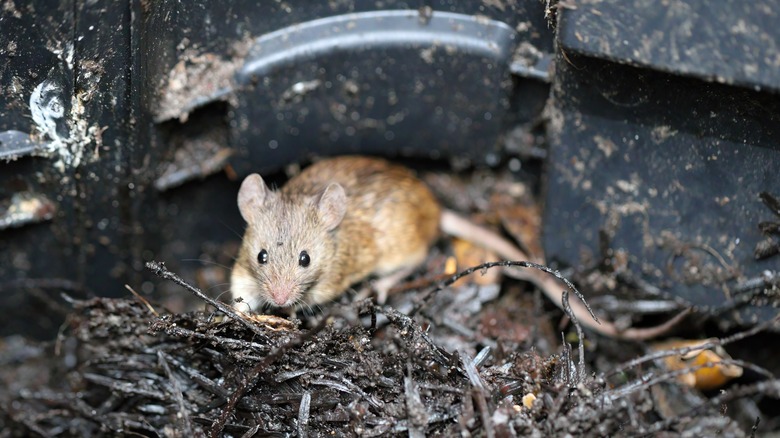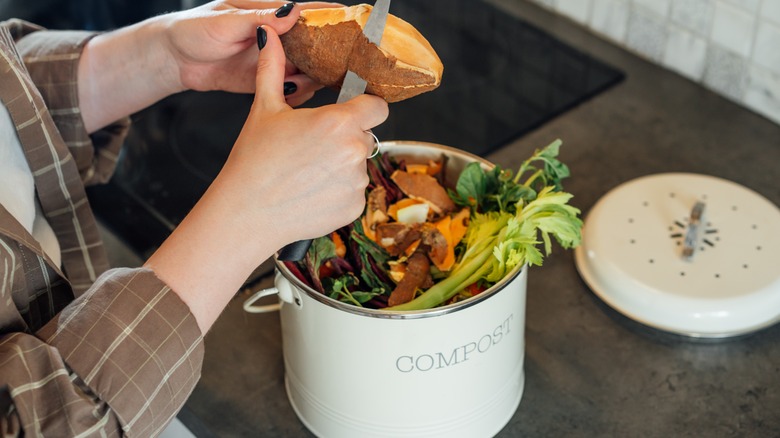How To Keep Rodents Out Of Your Compost Pile
We may receive a commission on purchases made from links.
Because of the nature of their composition, compost piles are going to be deemed treasure troves by rodents, including rats and mice. Whether you just started composting this week or you've been tumbling your pile for years, rodents will see a tasty snack when it comes to the food scraps and ugly produce that end up in compost. While we recognize these critters have to eat, one or two mice can quickly turn into something like an infestation, so it's better to prevent their appearance altogether. For tips on how to do that, Food Republic turned to expert Lauren Gropper, CEO and founder of Repurpose.
"One of the best ways to avoid rodents in backyard compost is to invest in a sturdy compost bin with a lid," she advised, "and place the compost bin on an elevated surface." She also suggested lining the bin with deterrents, such as chicken wire, and to "[break] down food scraps as much as possible before tossing into the compost bin" to help cover up the tantalizing food smell. She also pointed out that turning the compost regularly will help to aerate the pile, "making the compost a less than ideal place for a rodent to nest."
Some foods attract rodents more than others
Some foods are going to attract rodents more vigorously than others. Whereas your different types of lettuce and greens, like romaine and kale, aren't exactly hot-ticket items for mice, rats, and other critters, according to Lauren Gropper, "sugary foods ... like cookies or cake" are highly desirable for these animals, and they should stay out of your pile. Additionally, Gropper told us, avoid adding dairy, like cheese or your favorite store-bought butter, as your resident neighborhood pests will be drawn to it as it decomposes.
Also tasty-smelling to critters of the night? Scraps of meat, as well as fish. The foul reek emanating from these scraps as they break down and rot away is like a siren call to the pests in your neighborhood. And you shouldn't assume that just because you have a compost set-up that includes a lid or barrier it will keep rodents out; they can be very crafty and resourceful, especially when it comes to gaining access to their feast. You don't want to chance it — just keep the meat scraps out of your compost.
"A good rule of thumb for composting," Gropper explained, "if it's plain and you can eat it, it's probably safe to compost!" She also encouraged gardeners to "check ... their local composting guidelines" (there is often information about this on state or local government websites) "for specific questions about what can and cannot be composted in their area, as this often varies by location."
Avoid attracting rodents by composting indoors
You can actually compost on a small scale entirely in your kitchen, or get a head start on breaking down the food scraps before tossing the immature compost on your main outdoor pile. "Indoor composts can be set up inconspicuously on your kitchen counter, lined with durable, non-toxic bin bags, and ready for food scraps," said Lauren Gropper. These smaller, countertop compost bins often look like mini-garbage cans or pails with lids (like this model from KIBAGA). Aldi also sells a countertop compost bin once a year, typically in the spring, as part of its quick-selling Aldi Finds line, so keep your eyes peeled if you're in the market for one and the timing is right.
"Gardeners can also consider a home composter, like the Lomi home composting machine," Gropper suggested, adding that this food recycler actually breaks down your organics into rich soil. And incredibly, it does so in as little as three hours. Gropper went on to say that her company, Repurpose, also "offers certified compostable bags that are perfect for a home compost." What's more, they're Lomi-approved!



